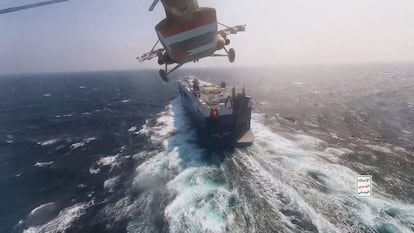BP is the latest company to pause Red Sea shipments over fears of Houthi attacks
Both oil and European natural gas prices rose partly over market nerves about attacks by the Iranian-backed Houthis, who confirmed two new attacks Monday

Oil and natural gas giant BP has joined the growing list of companies that have halted their shipments through the Red Sea because of the risk of attack from Yemen’s Houthi rebels, threatening a major trade route in what is expected to have global effects.
London-based BP said Monday that it has “decided to temporarily pause all transits through the Red Sea,” including shipments of oil, liquid natural gas and other energy supplies. Describing it as a “precautionary pause,” the company said the decision was under ongoing review but that it was prioritizing crew safety.
Both oil and European natural gas prices rose partly over market nerves about attacks by the Iranian-backed Houthis, who confirmed two new attacks Monday.
Brig. Gen. Yahya Saree, the Houthi military spokesman, said they launched what he described as “naval aircraft” at the Cayman Islands-flagged Swan Atlantic, a chemical and oil products carrier, and Panama-flagged MSC CLARA cargo ship. He didn’t offer further details.
Denmark-based operator Uni-Tankers said the Swan Atlantic, which was carrying vegetable oils to France’s Reunion Island off Madagascar in the Indian Ocean, was hit by an unknown object that ignited a small fire. Crew members put it out and all were reported to be safe, the company said in a statement. It received military aid and continued on its journey.
It’s the latest targeting of container ships and oil tankers passing through a narrow waterway that separates Yemen from East Africa and leads north to the Red Sea and Suez Canal, through which an estimated 10% of the world’s trade passes.
The Houthis have targeted Israeli-linked vessels during Israel’s war with Hamas but escalated their attacks last week, hitting or just missing ships without clear ties.
In the past few days, four of the world’s five largest container shipping companies have paused or rerouted movements through the Red Sea. MSC, Maersk, CMA CGM Group and Hapag-Lloyd are leaders in alliances that move basically all consumer goods between Asia and Europe, so “virtually all services will have to make this rerouting,” said Simon Heaney, senior manager of container research for Drewry, a maritime research consultancy.
Ships will have to go around the Cape of Good Hope at the bottom of Africa instead, adding days to voyages.
Depending on what companies decide to do, they will have to add more ships to make up the extra time or burn more fuel for the longer journey and if they decide to go faster to meet their itineraries — both of which would release more carbon dioxide, Heaney said.
Goods that stores needed for Christmas will have already been delivered, he said, but online orders could see delays.
“The impact will be longer transit times, more fuel spent, more ships required, potential disruption and delays — at least in the first arrivals in Europe,” he said, noting that ships could arrive from their longer journeys to ports “in clumps.”
That brings up the cost of shipping, but “I don’t think it’s going to go to the heights that it reached during the pandemic,” Heaney said.
Supply chain disruptions increased as people stuck at home during the Covid-19 pandemic ramped up orders for all sorts of products, driving up consumer prices around the world.
Disruptions expected from the Red Sea could have far-reaching effects because they would happen at the same time ships are being restricted through the Panama Canal, a major trade route between Asia and the United States.
Some companies had planned to reroute to the Red Sea — which is a crucial thoroughfare for Asia-Europe shipments — to avoid delays at the Panama Canal caused by a lack of rainfall, analysts say.
Now, some may be scared away from that alternative by the threat of Houthi attacks. That means those taking extra precautions to avoid risks and delays from both global trade arteries will have to take the longer journey around Africa.
“It’s unprecedented that the two have coincided,” Heaney said, adding that neither the Suez nor Panama canals are closed, “it’s just that they’re becoming less viable for the short term.”
The cancellations also will mean problems for cash-strapped Egypt, he said, with millions in fees that shipping companies pay to clear the Suez Canal representing a big source of income for a country whose economy is struggling with high inflation and a weakening currency.
Sign up for our weekly newsletter to get more English-language news coverage from EL PAÍS USA Edition
Tu suscripción se está usando en otro dispositivo
¿Quieres añadir otro usuario a tu suscripción?
Si continúas leyendo en este dispositivo, no se podrá leer en el otro.
FlechaTu suscripción se está usando en otro dispositivo y solo puedes acceder a EL PAÍS desde un dispositivo a la vez.
Si quieres compartir tu cuenta, cambia tu suscripción a la modalidad Premium, así podrás añadir otro usuario. Cada uno accederá con su propia cuenta de email, lo que os permitirá personalizar vuestra experiencia en EL PAÍS.
¿Tienes una suscripción de empresa? Accede aquí para contratar más cuentas.
En el caso de no saber quién está usando tu cuenta, te recomendamos cambiar tu contraseña aquí.
Si decides continuar compartiendo tu cuenta, este mensaje se mostrará en tu dispositivo y en el de la otra persona que está usando tu cuenta de forma indefinida, afectando a tu experiencia de lectura. Puedes consultar aquí los términos y condiciones de la suscripción digital.








































